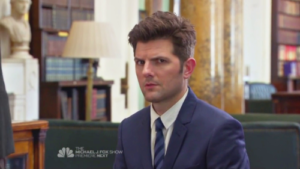Living in the Real World
A distressing column in The Chronicle of Higher Ed has been making the rounds this week – Gail A. Hornstein’s piece on why she doesn’t honor disability accommodations in her classroom. Many people more articulate than I have taken issue with the column – my favorite is Robin M. Eame’s response – but I want to point to a trope at the heart of Hornstein’s column that is often used to denigrate students and minimize their experiences.
Hornstein’s focus is mental health. “We want to prepare students for life in the world of adult work,” she writes, explaining why she believes some students’ accommodations for mental well-being or management are unnecessary. “Current attitudes on campuses make students seem fragile,” argues Hornstein, but “they can often cope better than they’re given credit for.” Learning when to cope on one’s own – rather than use legally-protected accommodations – is a “crucial life lesson . . . of adulthood, and we aren’t helping students who already have problems to succeed in their lives after college by treating them in a standardized manner or by overprotecting them.”
What Hornstein conjures up with these words is the trope of the ‘Real World’ – a world that begins after college is over and not before. After college, students are told, the world will not accommodate them, and they will have to grow up and deal with its demands. Taking mental disabilities into account in college is pampering or coddling students when they need to gather themselves up and prepare for the Real World’s rules.

I call bullshit.
Hornstein admits that “for some people, school is a refuge, a conflict-free zone where they can relax and be successful. (I know; I was one of them.)” What she does not also admit is that school is not a refuge for many people – it is the site of their assault, the place where racism is perpetuated toward them every day, the arena in which their financial situation is ignored. It is the Real World in every sense – students are not sexually assaulted in Narnia; racism is not a problem limited to the pages of Beloved; class differentials are not merely found in productions of Oliver Twist. As a consequence of trauma, of deep anxiety, of being erased, students develop mental disabilities. And more, students arrive with mental disabilities which will follow them their whole lives. Bi-polar disorder or schizophrenia do not take four or more years off while a student is in college. PTSD does not look up at the edifice of a campus and say, “Well, I guess I’ll just be quiet now.” ADHD does not enter a classroom, recognize it, and go on vacation.
The fantasy so many people hold – that college is a time away from Real World issues – is a fantasy rooted in privilege. It’s a fantasy, for Hornstein, produced by her own experience of a carefree college experience. It’s a fantasy, for others, founded upon a life free from disability, or, sometimes, upon having made it in the academy without help and support surrounding a disability, leaving some with the sense that everyone can – and should – tough it out in a similar fashion. It is a fantasy that ignores that our racial, gendered, sexual, linguistic, class-based identities are with us wherever we might be, and that our minds can react to stimuli in ways we cannot control.
The world is very real for the vast majority of our students – for the ones scrimping and saving to make it through college, sending money home to their family while they’re away; for the ones who weather a thousand micro- (and macro-) racial aggressions from the college community and who are slapped in the face by the confederate flag someone hung in their dorm room window; for the ones who are rebuilding their sense of bodily and psychological autonomy after someone tried to rip it from them; for the ones for whom the ADA was designed in order to provide equity to them as students and in their careers beyond college. It’s real for many more reasons for many more people. To suggest it’s a retreat, a rest, a break, is to profoundly misunderstand who our students are and the experiences with which they wrestle.
3 thoughts on “Living in the Real World”
Thank you so much for this. I’m sharing it with colleagues at the institution where I serve.
Thank you for sharing it!